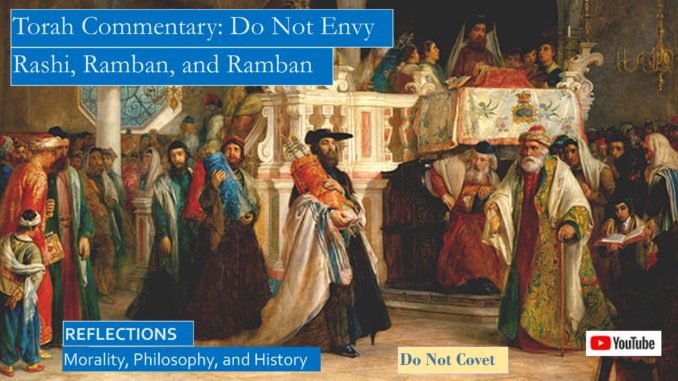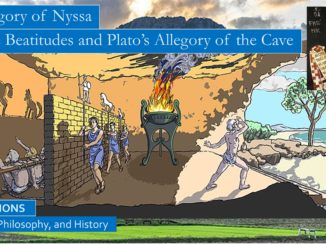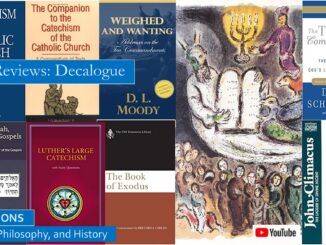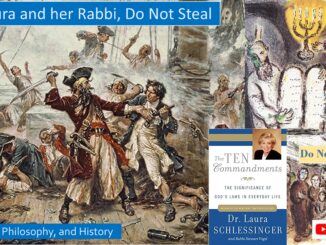
How true is Ramban’s observation, that the man “who does not covet will never harm his neighbor.”
Rambam splits coveting into two Mitzvoth:
Negative Mitzvah 265 and 266.
Do not covet your neighbor’s house.
Do not covet your neighbor’s wife,
His slave, his maid, his ox, his donkey,
Or anything else that belongs to his neighbor.
Deuteronomy 20:14
Prior blog on coveting: The Decalogue in the Torah, Blog 4, Coveting: The Sin That Leads To Many Other Sins
http://www.seekingvirtueandwisdom.com/the-decalogue-in-the-torah-blog-4-coveting-the-sin-that-leads-to-many-other-sins/
Rambam lists these as two Mitzvoth separately because the emphasis differs in Exodus and Deuteronomy. In Exodus we are forbidden to covet, while Deuteronomy forbids the mere desiring. Not only is coveting and envy forbidden, but we are also forbidden to plot or scheme that which is our neighbor’s. The mere expression of desire is forbidden, even if we offer to pay full price for that which can be bought, because sometimes even if we pay full price, our neighbor may still believe he was taken advantage of.
The Mitzvah against coveting appears in slightly different form in Exodus and Deuteronomy. In Exodus you are forbidden first to covet your neighbor’s house, then you are forbidden to covet his wife. In Deuteronomy you are forbidden first to covet your neighbor’s wife, then you are forbidden to desire his house. In Deuteronomy you cannot covet his field, and in both versions, you cannot covet or desire his slaves, his ox, his donkey, or anything else that is his neighbor. If the tablets were written today, your neighbor’s car would be on the list.
Ramban suggests that coveting your neighbor’s wife is listed first in Deuteronomy because it is the greatest sin of all. Coveting your neighbor’s husband is just as much a sin.
Coveting is perverse idolatry. The coveting, the looking , the desiring, always precedes theft and adultery.
I was wondering where to place the Mitzvoth forbidding kings to accumulate excess horses, numerous wives and abundant wealth. What happened when the wise King Solomon accumulated excess horses, wives, and wealth? These foreign wives led King Solomon to idolatry. And the Torah views idolatry as a form of religious adultery.
What happens to us, when we accumulate wealth and expensive cars? What happens when we listen to Madonna, and her material girl? We fall into idolatry, we risk neglecting the love of our neighbor, particularly our poor neighbors.
It occurred to me, compared to all those who lived in the ancient world, we all live like kings. We live far longer than those in the ancient world and in far greater health. We have an education where even children of maids can go to school and become doctors and lawyers and accountants.
In addition, we in the modern world have possessions they never dreamed about, like televisions and computers and the greatest invention of all time, aspirin. Why so? It was very common for kings and commoners alike in the ancient world to die of high fever, fever we control with simple aspirins.
Like many of the Mitzvah, we miss some of their meaning if we do not read them in the context of where they are placed in the Torah. So let us start from the section where Moses predicts the people will long for a king:
Negative Mitzvah 362.
When you arrive in the land
that Adonoy, your God, is giving you
and inherit it and live in it,
and you say,
“Let me appoint over me a king
Like all the nations around me.”
Appoint are you to appoint
Over yourself a king
Who Adonoy, your God, will choose.
From among your brothers
Are you to appoint over yourself a king;
You may not place over yourself a foreigner
Who is not your brother.
Deuteronomy 17:14-15
We quoted this rather than paraphrase it to see the repetition, casting the command in both positive and negative forms. The classic commentators only discuss this Mitzvah as it pertains to kings, but to us living today it tells us to choose our rulers with care. This not only means our political leaders but also choosing to work for a company or clients who are honest and can be trusted, and also to choose our spouses with care. We want to associate with people who encourage us to lead an honest and godly life, and not place ourselves in a place where we will be asked to hurt or neglect others.
Who shall we choose to surround us in our daily lives? Those who are not selfish, those who are generous, not those who always want to take from others.
Negative Mitzvah 363.
However, he (the king) must not acquire an abundance
Of horses for himself
So that he will not return
The people to Egypt
In order to acquire an abundance of horses,
Because Adonoy told you,
“You are not to proceed to return
Along this route again.”
Deuteronomy 17:16
We must not return to Egypt, we must not return to a godless, selfish life.
Negative Mitzvah 364.
And he (the king) is not to acquire an abundance
Of wives for himself
So that his heart will not veer;
Deuteronomy 17:17
How can men or women after being married for ten or twenty years with children just march in and say to their spouse that they are just no longer in love and march out, sometimes to their lovers, sometimes just to find themselves, like they are breaking up in high school? How can someone totally disregard the feelings of a spouse who loves them and is deeply attached to them? How can someone totally disregard the feelings of their children? How can someone just walk out knowing their spouse may even consider suicide? Are their own feelings so important they can just walk out like that?
Negative Mitzvah 365.
And silver and gold
He (the king) may not accumulate for himself
In great abundance.
Deuteronomy 17:18
The commentators note the king can gather funds needed to run the kingdom, but he must not keep the wealth all for himself.
The Talmud tells us the story of the first century convert to Judaism, King Adiabene, who “during the famine gave away all his wealth to the poor. When his relatives criticized him for squandering his riches he replied, ‘My ancestors stored up treasures for below, but I have stored up treasures for above; they stored their treasures in a place where power can prevail, but I in a place where force is powerless. They stored up treasures of money, but I of souls. They stored up treasures for others, but I for my own good. They stored up treasures in this world, but I for the world to come.’ “[1]
Although the king is forbidden to hoard silver and gold, the next Mitzvah mentions another type of treasure that you should gather to yourself all your days without measure:
Positive Mitzvah 17.
It shall be, that when he occupies
the throne of his kingdom,
he must write for himself a duplicate
of this Torah in a scroll form
before the kohanim- the Levites.
It is to accompany him
And he is to read in it
All the days of his life,
In order that he learn
To fear Adonoy, his God,
To guard every word of this Torah
And these statutes to fulfill them;
The king should not only learn the Torah, he should also copy it, have the Torah accompany him on his journey, read it, learn from it, the guard the words of the Torah, and fulfill them.
We are told in the Decalogue simply not to steal, not to murder, not to adulter, but in the last Commandment we are given a list of what we should not covet of our neighbors. But it is impossible to covet the most precious treasure of all, the teachings of the Torah, and we can share with our neighbor our Torah learning without measure.
Why should the king read the Torah all the days of his life?
That his pride not increase over his brothers
And he does not stray
From the commandment right or left;
So that the days of his reign are lengthy
Over his kingdom,
He and his sons within Israel.
Just as the king should only accumulate vast treasures for the sake of his kingdom, so we should study Torah primarily to learn how we should live our life.
Perhaps the prohibition against coveting, the last of the Commandments is referred to in the Mitzvah forbidding us to build a roof on a house without a parapet (or fence):
Negative Mitzvah 298.
When you build a new home,
You are to make a fence for your roof;
And do not place blood liability in your house,
For someone who should fall
May fall from it.
Deuteronomy 22:8-9
In the ancient cities in the Middle East many slept on the roof in the cool evening air, and without a parapet they would roll off into the street. There is a fine line between admiring that which our neighbor has, and coveting it. We cannot love our neighbor whose possessions we covet. When we covet we tear down the parapet guarding our soul, and risk rolling into more tangible sins like theft, murder and adultery.
Coveting is a sin of attitude. Who among us has never coveted? Who among us will never covet? Fear fell upon Israel after the issuing of this last commandment in Exodus 20:
All the people saw the sounds,
The flames, the sound of the shofar,
And mountain smoking.
The people saw and trembled,
And stood far off.
They said to Moses,
“You speak to us and we will listen.
Let Elohim not speak with us anymore lest we die.”
Moses said to the people,
“Do not be afraid.
It was to exalt you that Elohim came in this manner,
So that the fear of Him be on your faces
That you not sin.”
Rashi explains:
Due to the fact that you saw Him,
He is feared and dreaded.
You will thereby know that there is none beside Him
And you will therefore fear Him.
It is fitting that the Mitzvah forbidding coveting is followed in the Torah by the mountains made to smoke by an angry Elohim. Coveting crouches at our door, but we must master it. Through the door of coveting come all major sins. From coveting follows adultery, stealing, murder, slandering, and all selfishness.[2]
We should fear He who makes mountains to smoke and skies to shake and souls to shudder.
Next blog on Do Not Slander:
http://www.seekingvirtueandwisdom.com/the-decalogue-in-the-torah-blog-6-do-not-bear-false-witness-against-your-neighbor/
[1] Abraham Cohen, “Everyman’s Talmud” (New York: Schocken Books, 1949), quoting Tosifta Peah iv 18, p. 69.
[2] For those works cited that are organized by either Mitzvah or by verses, page references are unnecessary.
All Scripture quotations are from the Metsudah Chumash.
The Metsudah Chumash/Rashi, Five Volume Set, translated and/or annotated by Avrohom Davis, Hachum Kornfeld, and Abraham Walzer, (New York, Metsuda Publications, 1999-2002),
Rambam Maimonides, The Commandments, translated by Rabbi C Chavel, Volume One, Positive Commandments, Volume Two, Negative Commandments (New York: The Soncino Press, 1967)
Ramban Nachmanides, Commentary on the Torah, Five Volume Set, translated and annotated by Rabbi C Chavel (New York: Shilo Publishing House, 1976)
Ronald Eisenberg, The 613 Mitzvot, A Contemporary Guide to the Commandments of Judaism (Rockville, MD: Schreiber Publishing, 2005)
Richard Elliott Friedman, Commentary on the Torah (New York: Harper Collins, 2001)




2 Trackbacks / Pingbacks